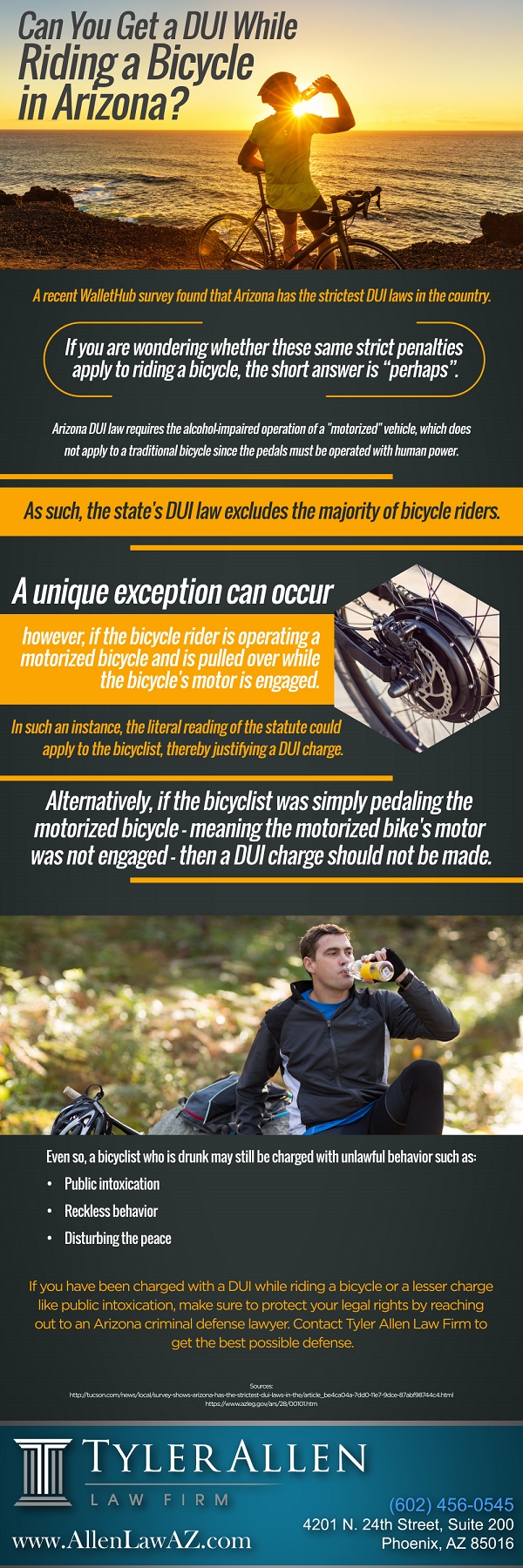Yes, you can get an OWI (Operating While Intoxicated) on a bicycle. Many people think OWI laws only apply to motor vehicles.
But that’s not true. Operating a bicycle while under the influence of alcohol or drugs can lead to legal trouble. Just like driving a car, riding a bike requires focus and coordination. When impaired, you pose a risk to yourself and others.
The law aims to keep all road users safe, including cyclists. In this blog, we will explore how OWI laws apply to bicycles, what the consequences are, and how to stay safe. Understanding these rules can help you make better decisions and avoid legal issues while enjoying your ride. Stay informed and ride responsibly.

Credit: nearu.pro
Owi And Its Implications
Operating While Intoxicated, or OWI, affects many individuals. It doesn’t only apply to motor vehicles. You can receive an OWI on a bicycle too. Understanding OWI and its effects is crucial. It helps you make informed choices.
Legal Definition Of Owi
OWI means operating a vehicle under the influence. This includes bicycles. The law doesn’t limit to cars or trucks. It targets any vehicle used on public roads. Alcohol or drugs impairing your ability can lead to an OWI. Even low levels of impairment matter. Law enforcement takes it seriously. They prioritize road safety for everyone.
Consequences Of Owi Convictions
An OWI conviction carries significant penalties. It may lead to fines or jail time. Your driving privileges may be suspended. This could disrupt daily life. You may also face increased insurance rates. Insurance companies view OWIs as high-risk behavior. Legal fees add to the burden. Convictions can affect employment opportunities too. Employers might hesitate to hire someone with an OWI record. The implications are widespread and long-lasting. Understanding these consequences can guide responsible decisions.
Bicycles Under The Law
Getting an OWI on a bicycle is possible under certain laws. Riding a bike while intoxicated can lead to legal consequences. Many regions treat bicycles like vehicles, enforcing similar rules for impaired riding.
Bicycles Under the Law You might think of your bicycle as a simple way to get around, but in the eyes of the law, it’s more than just two wheels and pedals. Bicycles are subject to rules and regulations, much like cars and motorcycles. But did you know that you can face legal repercussions, like an OWI (Operating While Intoxicated), even while cycling? Understanding the legal status of bicycles can save you from unexpected troubles.Bicycle As A Vehicle
In many places, bicycles are considered vehicles. This means they must follow the same traffic laws as cars. You’re not just pedaling down the street; you’re operating a vehicle. This includes obeying traffic signals, yielding to pedestrians, and using lights at night. Have you ever been on a bike and felt like the cars around you were treating you as if you didn’t belong on the road? It turns out, legally, you do. Cyclists have the same rights and responsibilities as motorists.Legal Status In Traffic Laws
Bicycles have a unique place in traffic laws. While they share the road with cars, they also have specific laws tailored to them. These laws vary by state or country, but many regions have strict rules about cycling under the influence. Picture yourself on a sunny day, enjoying a leisurely ride. You stop for a drink and think, “It’s just a bike; what’s the harm?” But if you’re over the legal limit, you might find yourself facing an OWI charge. Yes, it applies to bikes too. This legal status means you should always be aware of your sobriety when cycling. Just like driving a car, being impaired on a bicycle can put you and others at risk. Have you ever thought about the legal consequences of a bike ride after a few drinks? It might be worth reconsidering that next pedal-powered pub crawl. Remember, safety and legal compliance go hand in hand.Owi Applicability To Bicycles
Riding a bicycle while intoxicated can lead to an OWI charge in certain jurisdictions. Laws vary by state, but penalties may include fines or arrest. Always check local regulations to understand specific rules and consequences.
Navigating the world of law can be tricky, especially when it comes to the topic of Operating While Intoxicated (OWI) and its applicability to bicycles. You might think that having a few drinks and hopping on a bicycle is a harmless decision. However, the law might see it differently. Understanding how OWI laws apply to bicycles can save you from unexpected legal troubles. ###State-specific Laws
OWI laws vary significantly from one state to another. In some states, bicycles are treated like any other vehicle, meaning you could face the same penalties as someone driving a car while intoxicated. For example, in states like Iowa and Wisconsin, OWI laws explicitly include bicycles. On the other hand, states like California have more lenient rules, where the penalties for cycling under the influence are less severe than those for driving a car. It’s crucial to know how your state handles such cases. A quick search or consultation with a local attorney can provide clarity. Wouldn’t you rather be informed than surprised by a hefty fine or legal battle? ###Case Studies And Precedents
Real-life cases show how seriously different jurisdictions take cycling under the influence. Consider the case in Minnesota, where a man was charged with OWI while riding his bicycle home from the bar. The case reached the state’s Supreme Court, which upheld the charge, reinforcing that bicycles fall under vehicle laws in Minnesota. In contrast, a case in Oregon saw a cyclist arrested for cycling under the influence. However, the charges were dropped due to ambiguous state laws regarding bicycles. These precedents highlight the importance of knowing the legal landscape in your area. They also reveal the potential consequences of taking a relaxed approach to biking after drinking. Have you ever thought about how your actions on a bicycle could land you in a courtroom? Understanding these laws and cases can help you make informed decisions. By being aware of these details, you can stay on the right side of the law and ensure your cycling adventures remain enjoyable and trouble-free.Legal Consequences For Cyclists
Riding a bicycle while intoxicated can lead to serious consequences. Many cyclists believe they are safe from legal repercussions. This assumption is often incorrect. Laws vary by state, but operating a bicycle while impaired is illegal in many places. Cyclists face penalties similar to those faced by motor vehicle drivers. Understanding the potential legal consequences is crucial for any cyclist.
Potential Penalties
Operating a bicycle while intoxicated can result in fines. These fines can be significant, impacting your finances. You might also face community service requirements. In some cases, jail time is possible. The severity of penalties often depends on the jurisdiction. Repeat offenses can lead to harsher penalties. It’s important to know your local laws. They will determine the specific consequences you face.
Impact On Driving Privileges
Driving privileges may be affected by a bicycle OWI. Even if you’re not driving a car, your driver’s license can be suspended. This can happen if your state treats bicycle OWI like motor vehicle OWI. Losing driving privileges can disrupt daily life. It’s crucial to understand how a bicycle OWI impacts your license. You might need to take additional steps to regain driving privileges. Avoiding intoxicated cycling protects both your freedom and your license.
Safety Concerns And Owi
Operating a vehicle under the influence, or OWI, is serious. But can it apply to bicycles? This question raises safety concerns. Cyclists often share roads with cars. So, understanding the risks is crucial. Drinking and cycling can lead to dangerous situations. It affects both the cyclist and others on the road. Let’s explore this topic further.
Risks Of Cycling Under Influence
Cycling under the influence impairs judgment. It reduces reaction time. Alcohol affects balance and coordination. This increases the chance of falling. Traffic signals might be missed. Unexpected obstacles become harder to navigate. Night cycling becomes even more dangerous. Visibility and alertness decrease significantly.
Public Safety Implications
Drunk cycling endangers not just the rider. It poses risks to pedestrians and other road users too. A cyclist might swerve into traffic. Collisions with cars or pedestrians can occur. Public walkways and parks are not immune. Children and families often frequent these areas. Safety should always be a priority.
Defending Against Owi Charges
Facing OWI charges on a bicycle may seem surprising but is possible. Laws often apply to all vehicles, including bicycles. Understanding local regulations can help you defend against unexpected legal issues.
Facing an OWI (Operating While Intoxicated) charge on a bicycle may seem unusual, yet it’s a serious matter. Defending against such charges requires understanding the legal landscape and knowing your options. If you find yourself in this situation, it’s crucial to be informed and prepared. ###Legal Defenses Available
Several defenses might be available to you if charged with an OWI on a bicycle. Challenging the evidence is one approach. For example, questioning the accuracy of field sobriety tests can be a valid defense. Another defense could involve disputing the officer’s observations. Were you actually riding the bicycle, or merely in the vicinity? Sometimes, mistaken identity can play a role, especially in crowded areas. Medical conditions might also serve as a defense. Certain health issues can mimic intoxication signs, such as unsteady balance. ###Role Of Legal Representation
Having a competent lawyer can make a significant difference in your case. They can help you understand the charges and navigate the legal system. A good attorney will evaluate the evidence and identify weaknesses in the prosecution’s case. Legal representation is not just about court appearances. It’s also about negotiating with prosecutors. An experienced lawyer might help in reducing the charges or even getting them dismissed. Consider asking yourself: Do you fully grasp the complexities of your situation? If not, consulting with legal representation may be a wise step. Engaging with a professional can offer peace of mind and a clearer path forward. If you’ve faced a similar situation, what strategies worked for you? Sharing your experience could be valuable for others in the same boat. Always remember, seeking help and guidance is a strength, not a weakness.Preventive Measures
Preventive measures can help reduce the risk of receiving an OWI on a bicycle. Education and safety play key roles in promoting responsible cycling behavior. By implementing specific strategies, cyclists can enjoy safer rides. These measures not only protect the rider but also enhance road safety for everyone.
Promoting Safe Cycling
Safe cycling practices are essential to prevent accidents and legal issues. Riders should always wear helmets to protect against head injuries. Reflective clothing increases visibility, especially at night. Using hand signals helps communicate intentions to other road users. Regular maintenance of bicycles ensures brakes and lights function properly. Cyclists should avoid alcohol consumption before riding. Drunk cycling can lead to poor decision-making and accidents.
Educational Campaigns
Educational campaigns can raise awareness about the risks of cycling under influence. Schools and community centers can host workshops on cycling safety. These sessions teach the importance of following traffic rules. They also emphasize the dangers of riding while intoxicated. Local governments can distribute safety brochures and posters. Social media platforms can also be used to spread safety messages. Engaging videos and infographics can capture the attention of young riders.

Credit: www.allenlawaz.com
Future Of Owi Laws For Cyclists
The future of OWI (Operating While Intoxicated) laws for cyclists is a topic gaining attention as more people turn to bicycles for transportation. With the rise in cycling, there is a growing need to address safety and legal concerns. As cycling becomes a more common mode of transport, what changes can we expect in OWI laws for those on two wheels?
Potential Legal Reforms
Legal reforms around OWI laws for cyclists could bring about significant changes. Some states are already considering the implications of applying motor vehicle laws to bicycles. Could your state be next in line for such reforms?
These potential changes could redefine what it means to cycle responsibly. Imagine cycling home after a dinner with friends, only to find the laws have shifted and your actions are now scrutinized under stricter regulations. Would this alter your decision to bike instead of drive?
Moreover, some legal experts suggest creating separate categories for cycling offenses. This would acknowledge the distinct nature of bicycles compared to cars. How would this impact your daily cycling routine?
Influence Of Advocacy Groups
Advocacy groups play a crucial role in shaping OWI laws for cyclists. Organizations dedicated to cycling safety and rights are increasingly vocal. They aim to influence legislation by highlighting the unique needs of cyclists.
Your local cycling group might already be involved in discussions with policymakers. These groups often push for laws that balance public safety with the practical realities of cycling. Could joining such a group empower you to have a say in future laws?
Advocacy efforts also focus on education and awareness. They stress the importance of understanding how OWI laws affect cyclists. As a cyclist, staying informed could be your best tool in navigating these evolving legal landscapes.
In this rapidly changing environment, staying updated on potential legal reforms and the influence of advocacy groups is essential. How do you envision the future of cycling in your community? Your voice and actions could be pivotal in shaping the future of OWI laws for cyclists.

Credit: milwaukee-criminal-lawyer.com
Frequently Asked Questions
In What State Can You Get A Dui On A Bicycle?
Many U. S. states, including California and Colorado, allow DUI charges for cycling under the influence. Laws vary by state. Always check local regulations before biking.
What Is A Dui On A Bicycle Called?
A DUI on a bicycle is often called “BUI” or “Biking Under the Influence. ” It refers to riding a bike while intoxicated.
What Are The Penalties For Dui On A Bicycle?
Penalties for DUI on a bicycle can include fines, mandatory classes, and possible jail time. Laws vary by state. Always consult local regulations.
Can You Get An Owi On A Horse In Iowa?
Yes, you can get an OWI in Iowa for riding a horse while intoxicated. Iowa law defines “vehicle” broadly, including horses. Riding under the influence poses safety risks and legal consequences. Always prioritize safety and abide by local laws to avoid an OWI charge.
Conclusion
Getting an OWI on a bicycle is possible. Laws vary by location. Stay safe and avoid drinking when biking. Always know local laws to prevent legal trouble. Protect yourself and others by biking responsibly. Responsible choices lead to safer roads.
Biking should be enjoyable and safe for everyone.




